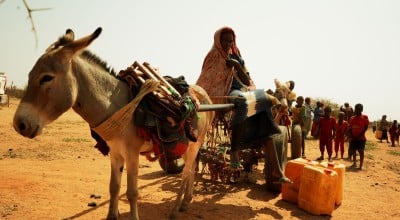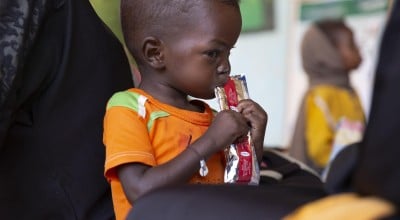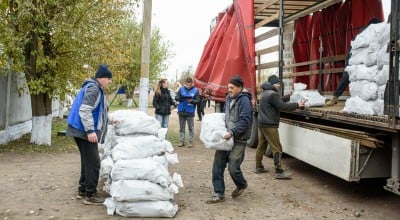
Read our 2024 annual report

Knowledge Hub
President Higgins warns of new arms race
President of Ireland, Michael D. Higgins, has warned against a new arms race being embarked upon by permanent members of the United Nations Security Council in a speech at Concern Worldwide’s 50th anniversary conference at Dublin Castle today.
[This press release was issued on Friday, September 7 during Concern's 50th Anniversary Conference, Resurgence of Humanity: Breaking the Cycle of Conflict, Hunger and Human Suffering]
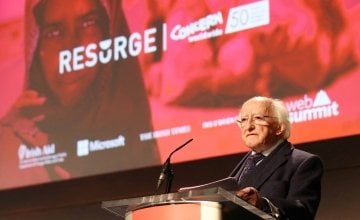
President Higgins spoke of the role of UN members in the new “arms race,” where “the arms industry now exports weapons of death and destruction for use in Syria, the Democratic Republic of Congo and Yemen”, saying: “the self-defeating rhetoric of the arms race, and the immorality of the arms trade, only serve to fuel current and future wars.”
He added: “The conflict in Yemen is actively sustained by the sale of arms and by the support of some members of the Security Council. It is a stark example of the triumph of the diplomacy of transaction, and of narrow national interest, over the diplomacy of the common good embodied by the Charter of the United Nations. The United Nations needs global support. Imperfect as all institutions may be, it is our best space for alternatives to war and ecological destruction.
We are all part of a common humanity
President Higgins acknowledged the role of Irish humanitarian agency Concern Worldwide in tackling the fallout of such action, and said: “Through fifty years of action and advocacy, Concern has stood for a different vision of the world, one in which power yields to justice, one which recognises that we are all part of a common humanity, owing to ourselves and to others, not only of compassion, but of solidarity.”
President Higgins said the reduction of famines in recent times is “testament to the success of United Nations agencies such as the World Food Programme and UNICEF, now under severe threat through underfunding, working in partnership with humanitarian organisations such as Concern.”
Further acknowledging the role of Concern over the last fifty years, he said: “That revolutionary year of 1968 witnessed not only the emergence of a new humanitarian conscience in the Global North, in response to the television images of famine and suffering in Africa, through the formation of organisation such as Concern, but also a moment of emancipation and liberation across the world, all amidst the turmoil and tragedy of the Cold War.”
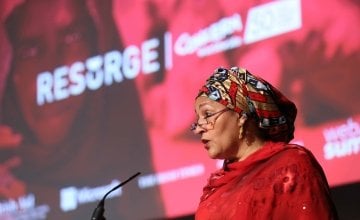
UN Deputy Secretary-General, Amina J. Mohammed, also addressed the conference this morning when she urged countries to commit to the overseas aid commitment of 0.7 per cent of gross national income.
Deputy Secretary-General Mohammed, said: “Without rapid and sustained investment, pockets of stability will disappear and conflict will continue to spread. We must find ways to steer greater private and public investments towards these countries and areas where the risks and needs are greatest and we have to do that rapidly.
Famine is never inevitable
“All donors must find the political will to reach the 0.7 per cent overseas aid commitment, an expression of your compassion and collective responsibility, an investment in the stability and prosperity in which increasingly interdependent nation economies depend.”
She added: “The Irish people know only too well that famine is never inevitable, but rather the consequence of poor policy, inaction and negligence; that those fleeing persecution and famine today must be given safe haven.”
President Bill Clinton is due to make his keynote speech about peacebuilding this afternoon.
The conference, ‘Resurgence of Humanity: Breaking the Cycle of Conflict, Hunger and Human Suffering,’ has brought together key policymakers and humanitarian practitioners to identify concrete actions that are urgently needed to address conflict, hunger and human suffering.
For more information, please contact Kevin Jenkinson at kevin.jenkinson@concern.net or on 0863582886.

Other ways to help
Corporate support
Is your company interested in working together for a common cause?
Fundraise for Concern
From mountain trekking to marathon running, cake sales to table quizzes, there are lots of ways you can support our work.
Buy a gift
With an extensive range of alternative gifts, we have something to suit everybody.
Leave a gift in your will
Leave the world a better place with a life-changing legacy.
Volunteer with Concern
The lots of ways to get involved with our work as a volunteer
School fundraising
Without the generous support from schools, we wouldn't be able to do the work that we do.


